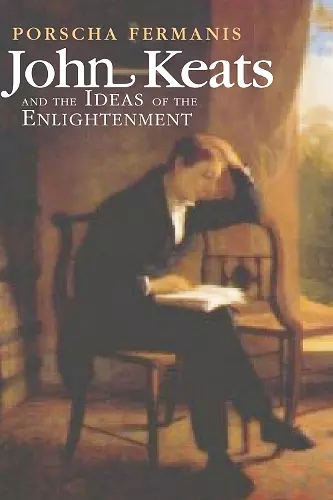John Keats and the Ideas of the Enlightenment
Format:Hardback
Publisher:Edinburgh University Press
Published:30th Sep '09
Currently unavailable, and unfortunately no date known when it will be back

John Keats is generally considered to be the least intellectually sophisticated of all the major Romantic poets, but he was a more serious thinker than either his contemporaries or later scholars have acknowledged. This book provides a major reassessment of Keats's intellectual life by considering his engagement with a formidable body of eighteenth-century thought from the work of Voltaire, Robertson, and Gibbon to Hutcheson, Hume, and Smith. The book re-examines some of Keats's most important poems, including The Eve of St Agnes, Hyperion, Lamia, and Ode to Psyche, in the light of a range of Enlightenment ideas and contexts from literary history and cultural progress to anthropology, political economy, and moral philosophy. By demonstrating that the language and ideas of the Enlightenment played a key role in establishing his poetic agenda, Keats's poetry is shown to be less the expression of an intuitive young genius than the product of the cultural and intellectual contexts of his time. Key Features: *The first book-length consideration of the relationship between Keats and the ideas of the Enlightenment *New and distinctive argument about Keats reassessing his intellectual life and contexts *Contributes to our understanding of the relationship between the Romantic period and the eighteenth century/Enlightenment, currently one of the most important debates in literary scholarship *Wide appeal to scholars, postgraduates and advanced undergraduates of eighteenth-century and Romantic period literature, history and philosophy; cultural and intellectual historians; historians of ideas
In this consistently illuminating and original book Porscha Fermanis places Keats within the history of ideas, persuasively offering us a poet-thinker whose response to the great writers of the Enlightenment was both informed and sympathetic. In a scholarly and thoughtful account, she presents fresh and invigorating readings of the great narrative poems, inviting us to re-consider our normal assumptions about Romanticism and its relationship with eighteenth century thought. John Keats and the Ideas of the Enlightenment is a substantial contribution to our growing sense of the historical Keats. -- Seamus Perry, Balliol College, Oxford Porscha Fermanis argues persuasively for a reassessment of Keats's relationship with Enlightenment ideas. In cogent, lucid, and well-informed readings of Keats's longer poems, she provides a creatively enabling sense of what the Enlightenment was and meant to the poet. Keats may have mistrusted aspects of rationalist or progressivist thought, but Porscha Fermanis shows how profoundly his poems engage with the Enlightenment 'science of man'. Offering an original perspective from which to think about the poet's thought, John Keats and the Ideas of the Enlightenment is an impressive and important achievement. -- Michael O'Neill, Durham University In this consistently illuminating and original book Porscha Fermanis places Keats within the history of ideas, persuasively offering us a poet-thinker whose response to the great writers of the Enlightenment was both informed and sympathetic. In a scholarly and thoughtful account, she presents fresh and invigorating readings of the great narrative poems, inviting us to re-consider our normal assumptions about Romanticism and its relationship with eighteenth century thought. John Keats and the Ideas of the Enlightenment is a substantial contribution to our growing sense of the historical Keats. Porscha Fermanis argues persuasively for a reassessment of Keats's relationship with Enlightenment ideas. In cogent, lucid, and well-informed readings of Keats's longer poems, she provides a creatively enabling sense of what the Enlightenment was and meant to the poet. Keats may have mistrusted aspects of rationalist or progressivist thought, but Porscha Fermanis shows how profoundly his poems engage with the Enlightenment 'science of man'. Offering an original perspective from which to think about the poet's thought, John Keats and the Ideas of the Enlightenment is an impressive and important achievement.
ISBN: 9780748637805
Dimensions: unknown
Weight: 497g
232 pages